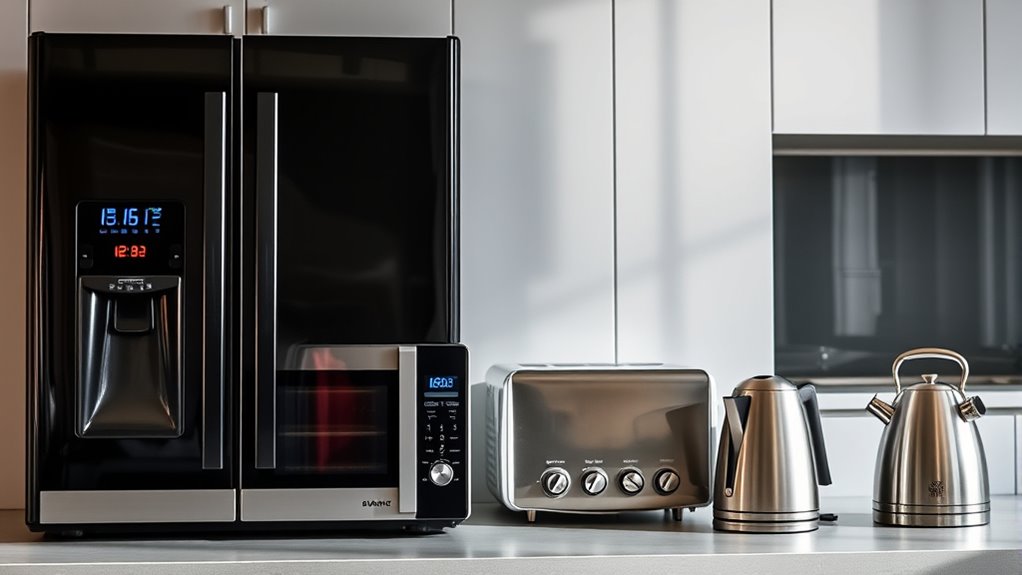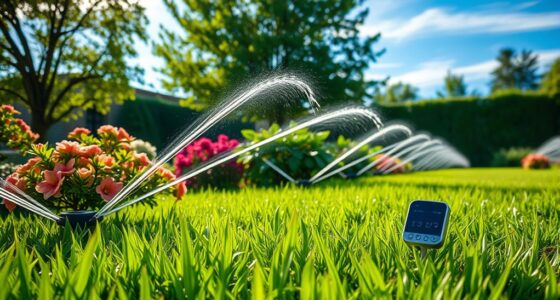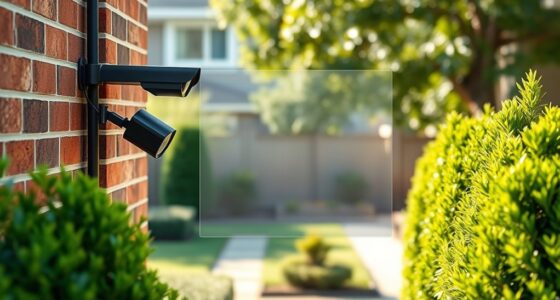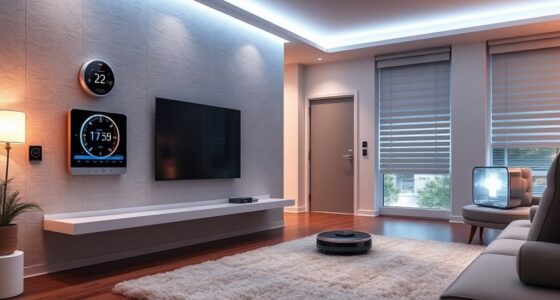Smart appliances offer great convenience, energy savings, and remote control, making daily routines easier. However, they usually come with higher upfront costs and potential durability concerns compared to traditional models. If you want advanced features and easier automation, smart devices may be worth it—just be aware of compatibility and security questions. For long-term durability and simplicity, traditional appliances might serve you better. To figure out what suits your lifestyle, explore the key advantages and drawbacks further.
Key Takeaways
- Smart appliances offer convenience, remote control, and energy savings, making them ideal for tech-savvy users seeking automation.
- Traditional “dumb” appliances tend to be more durable, easier to repair, and have longer lifespans, providing better reliability.
- The higher initial cost of smart devices may be offset by long-term savings and added features, but compatibility issues can be a concern.
- Privacy and security risks with smart appliances require ongoing updates and cautious setup, unlike traditional models with minimal data concerns.
- For basic, long-lasting needs, traditional appliances are often more cost-effective; smart appliances suit those valuing convenience and modern features.
Understanding the Benefits of Smart Appliances

Smart appliances offer numerous benefits that can make your daily routines more efficient and convenient. With voice control, you can operate your devices hands-free, allowing you to adjust settings or check statuses effortlessly. Imagine telling your smart oven to preheat or your smart washer to start a cycle without lifting a finger. Remote monitoring lets you keep an eye on your appliances from anywhere, giving you peace of mind and control whether you’re at work or on vacation. These features save time, reduce effort, and help prevent issues before they become problems. Additionally, some smart appliances can alert you to maintenance needs or potential malfunctions, helping you prevent breakdowns before they happen. By integrating smart appliances into your home, you enjoy seamless convenience and enhanced control, making everyday chores simpler and more manageable.
Cost Considerations: Are Smart Devices Worth the Price?
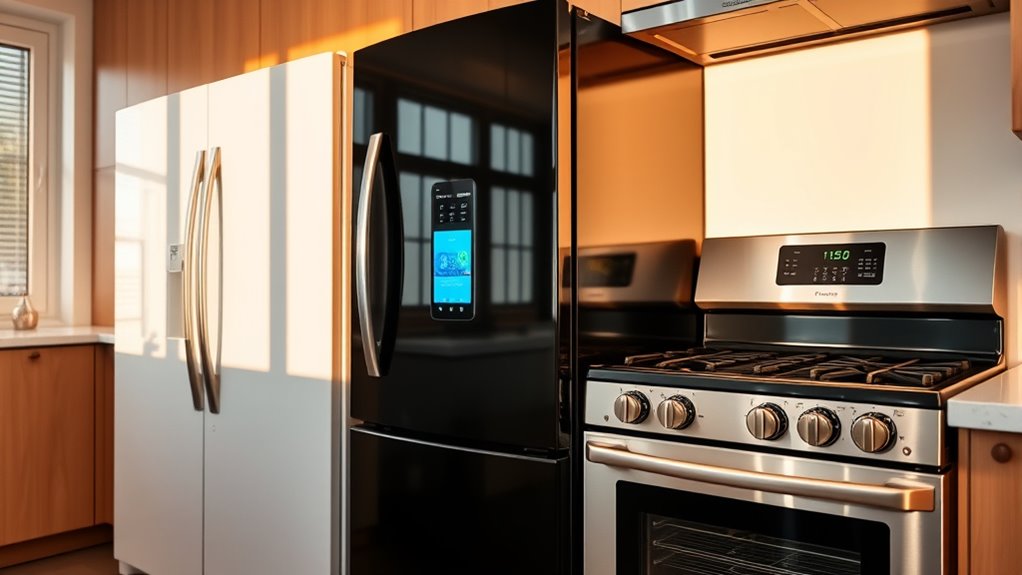
Smart devices often come with a higher upfront cost, which can make you hesitate at the register. However, they might save you money over time through energy efficiency and convenience. Consider whether the long-term savings outweigh the initial investment for your lifestyle. For example, Mazda Tuning demonstrates how performance upgrades can provide lasting value beyond the initial expense.
Initial Purchase Cost
While the initial purchase price of smart appliances is often higher than traditional ones, deciding whether they’re worth the extra cost depends on your priorities. Smart devices tend to have a higher upfront investment, influenced by factors like brand reputation and aesthetic appeal. A well-known brand may command a premium, but often offers better reliability and features. Consider how the appliance fits your style—sleek, modern designs can enhance your space’s aesthetic appeal, justifying the cost for some. Here’s a quick comparison:
| Feature | Traditional Appliance | Smart Appliance |
|---|---|---|
| Brand Reputation | Varies | Generally higher |
| Aesthetic Appeal | Basic design | Stylish, modern |
| Initial Cost | Lower | Higher |
Ultimately, weigh initial costs against these qualities to decide if the upgrade makes sense for you. Additionally, understanding contrast ratio can help you evaluate how well a smart device performs visually compared to traditional options.
Long-term Savings
Although smart appliances typically cost more upfront, they can save you money over time through energy savings and automation benefits. By optimizing energy use, smart devices reduce your utility bills, making them a smart long-term investment. For example, smart thermostats adjust temperatures based on your schedule, preventing energy waste. Additionally, their convenience benefits mean you spend less time managing appliances and more time enjoying their features. Over months and years, these efficiencies add up, offsetting the initial higher price. An understanding of energy efficiency can help you see the full value of upgrading. While the upfront cost may seem steep, the combination of energy savings and enhanced convenience can make smart appliances more cost-effective in the long run. If you’re looking to cut costs and improve home management, upgrading to smart devices could be a wise choice.
Compatibility and Integration With Existing Systems
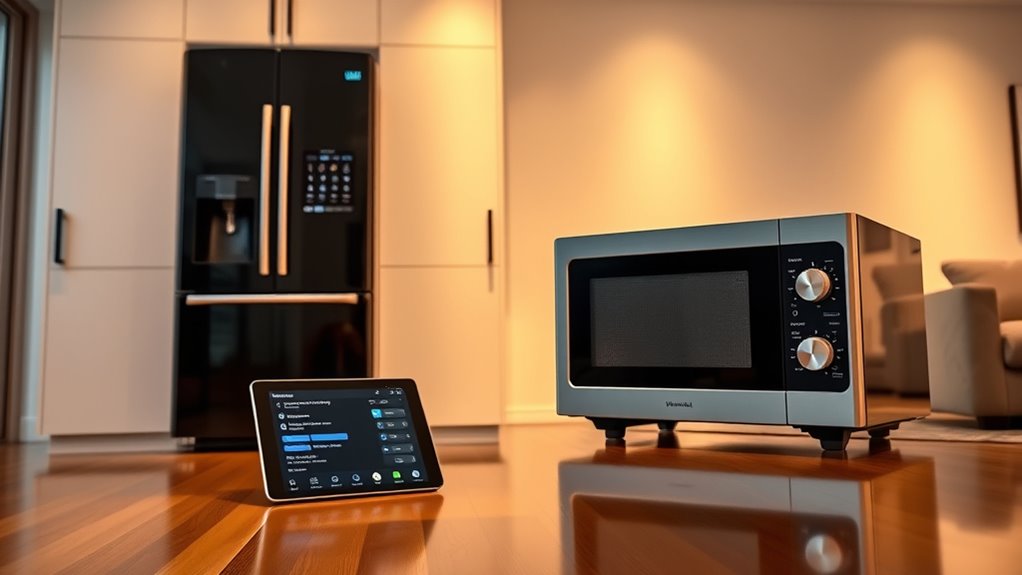
Compatibility and integration are essential factors to contemplate when choosing between smart and “dumb” appliances, especially if you want your devices to work seamlessly together. Smart appliances often offer voice control, making it easy to operate them hands-free, but they also depend heavily on app compatibility. If your current smart home ecosystem isn’t compatible with a new device, you might face frustrating limitations or the need for additional hubs. Before upgrading, verify that the appliance integrates smoothly with your existing system and supports your preferred voice assistants. If compatibility issues arise, you could end up with a device that doesn’t function as intended or requires complex workarounds. Ensuring compatibility helps maximize convenience and avoids future headaches. Considering self watering plant pots can be a practical example of smart integration, as some models include sensors and app controls for better plant care management.
Energy Efficiency and Environmental Impact
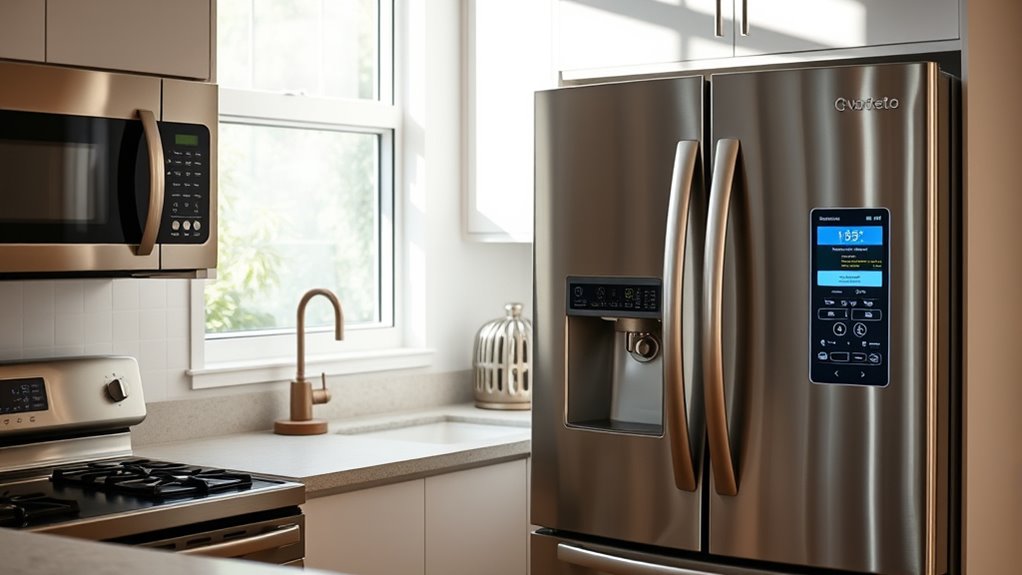
Smart appliances often boast energy-saving features that can reduce your household’s environmental footprint, making them an appealing choice for eco-conscious consumers. By optimizing energy consumption, these devices help you lower utility bills and lessen your impact on the environment. Consider these key benefits:
- Lower energy consumption due to intelligent operation and adaptive settings.
- Reduced greenhouse gas emissions from more efficient energy use.
- Eco-friendly modes that minimize waste and conserve resources.
- Incorporating tuning techniques similar to automotive upgrades can further enhance their performance and efficiency.
Upgrading to smart appliances can considerably improve your home’s sustainability profile. They enable you to monitor and control energy use remotely, ensuring you’re not wasting power when appliances aren’t in use. Overall, these features make smart appliances a smarter choice for reducing your environmental footprint.
Privacy and Security Concerns With Connected Devices

While connected devices offer convenience and control, they also introduce significant privacy and security risks. Your data privacy can be compromised if these devices collect and share personal information without clear safeguards. Hackers target connected appliances to exploit vulnerabilities, increasing hacking risks that could lead to unauthorized access or control over your home. Weak security protocols or outdated firmware make these devices easy targets. Once breached, sensitive data can be stolen, or malicious actors could manipulate your devices, putting your privacy and safety at stake. To protect yourself, choose appliances with robust security features, update firmware regularly, and review privacy settings. Being aware of these risks helps you make smarter decisions about upgrading to smart appliances while safeguarding your home. Security Zone Info indicates that homes with inadequate security measures are much more vulnerable to breaches, emphasizing the importance of choosing secure devices.
The Longevity and Reliability of Smart vs. Traditional Models
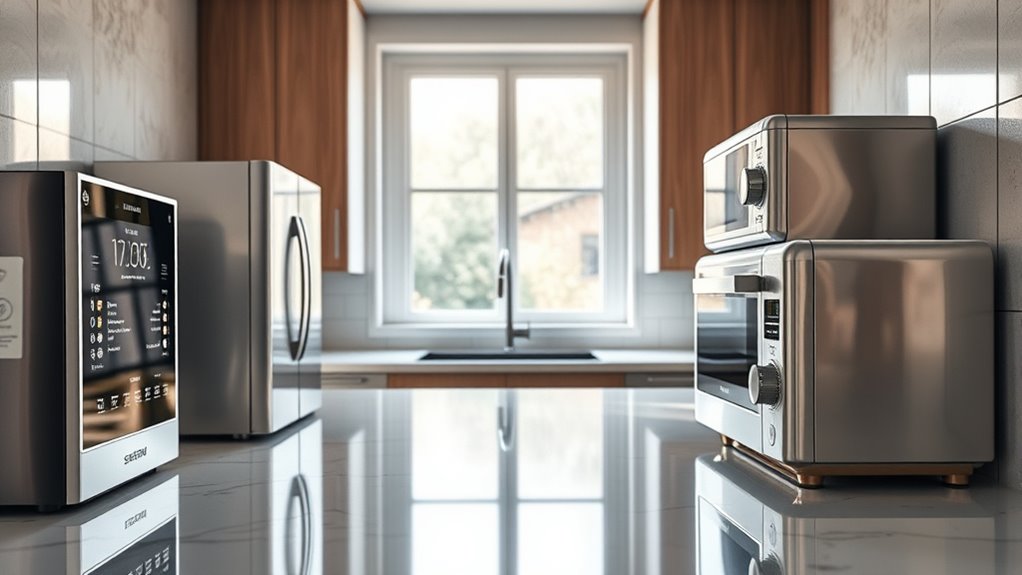
Smart appliances often have complex components that can wear out or fail over time, potentially leading to costly repairs. Traditional models tend to be more straightforward and durable, making them easier and cheaper to maintain. Consider how the longevity and maintenance needs of each type impact your overall reliability. Additionally, advancements in AI-driven solutions are beginning to influence the development of more durable and efficient appliances.
Durability Over Time
Traditional appliances have a proven track record of lasting for many years with minimal issues, often outliving their smart counterparts. Their durability relies heavily on product lifespan and material quality, which tend to be more consistent over time. Smart devices, with their complex electronics and software, can face issues that reduce their longevity. Additionally, automation technologies in smart appliances can sometimes lead to increased points of failure, impacting their overall durability. Consider these factors:
- The robustness of materials used in traditional models often results in longer durability.
- Limited technological components in “dumb” appliances mean fewer points of failure.
- Product lifespan is generally more predictable due to simplified design and fewer electronic parts.
While smart appliances may offer advanced features, their durability over time can be less reliable compared to traditional options.
Maintenance and Repairs
Durability is a key factor in evaluating appliances, but how they hold up over time also depends on maintenance and repair needs. Smart appliances often require specialized repairs, which can lead to higher repair costs and longer downtimes, making regular appliance upgrades less appealing. Traditional models tend to be simpler, with fewer electronic components, reducing the likelihood of breakdowns and lowering repair expenses. Proper maintenance extends the lifespan of both types, but smart appliances may need software updates and calibration, adding to long-term costs. If you prioritize reliability and minimal repair needs, sticking with traditional models might be smarter. Additionally, ease of repair is a significant consideration, as traditional appliances generally allow for easier troubleshooting and replacement of parts. However, if you’re comfortable managing tech-related repairs and enjoy the benefits of advanced features, investing in smart appliances could be worthwhile despite potentially higher repair costs.
Practical Uses: Which Appliances Truly Enhance Daily Life?
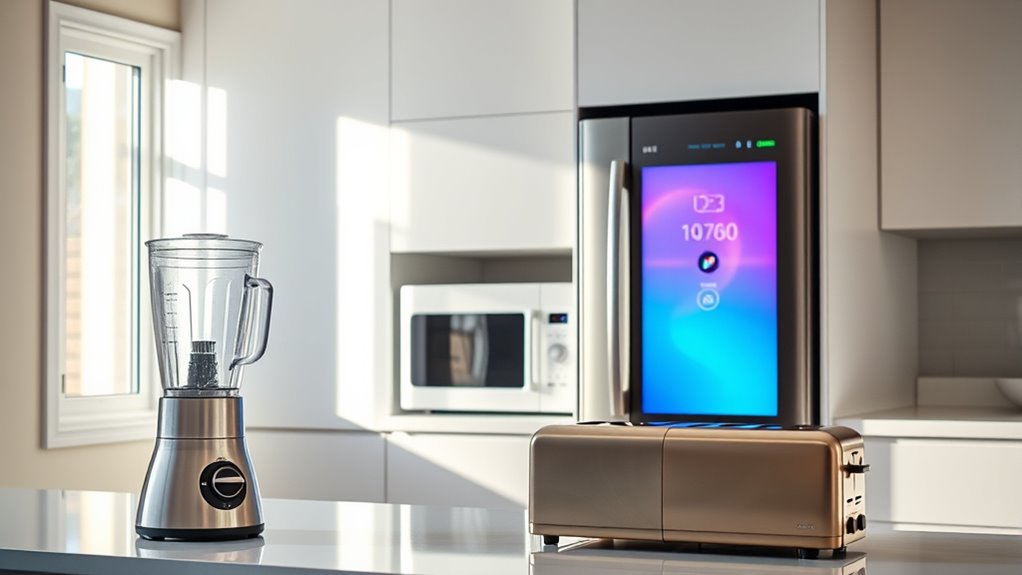
While not every appliance needs to be connected or high-tech, some smart devices can genuinely make daily routines easier. Imagine controlling your appliances effortlessly with a remote control or voice activation—no more fumbling for switches. Here are three appliances that truly enhance daily life:
- Smart Thermostats: Adjust your home’s temperature remotely, saving energy and ensuring comfort when you arrive home.
- Smart Lighting: Use voice commands to turn lights on or off, dim, or change colors, creating the perfect ambiance without getting up.
- Smart Kitchen Devices: From coffee makers to refrigerators, these appliances can be operated via remote control or voice, streamlining meal prep and grocery management.
These tools simplify routines, giving you more time and convenience.
Making the Right Choice Based on Lifestyle and Budget
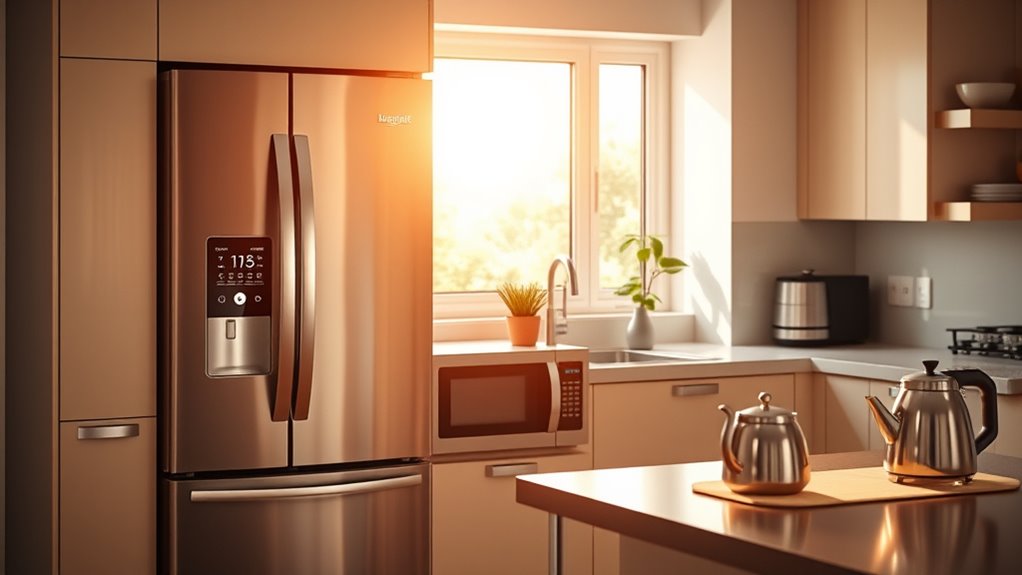
Are you selecting appliances that truly fit your lifestyle and budget? It’s crucial to consider your budget constraints and lifestyle needs before upgrading. If your budget is tight, focus on essential appliances that offer the most value and efficiency. Think about your daily routines—do you need smart features for convenience, or are basic models sufficient? For active families, durable, straightforward appliances might better serve your lifestyle, while tech-savvy users may benefit from smart appliances that streamline chores. Balancing cost and functionality ensures you make a smart investment. Remember, not every upgrade is necessary; choose appliances that align with your financial situation and daily habits to maximize satisfaction and avoid unnecessary expenses.
Frequently Asked Questions
How Do Smart Appliances Affect Home Insurance Premiums?
Smart appliances can lower your home insurance premiums by offering insurance discounts, as insurance providers see them as risk mitigation tools. These devices help prevent issues like leaks or fires, reducing potential claims. By upgrading to smart appliances, you demonstrate responsible home management, which may qualify you for lower rates. Always check with your insurer to understand specific discounts available and verify your new gadgets are compatible with their risk mitigation programs.
Can Smart Appliances Be Easily Repaired or Serviced Locally?
Think of your smart appliances as high-tech allies in your home—powerful but needing specialized help. When repair accessibility and local maintenance come into play, it’s a mixed bag. Some smart devices are easier to fix locally thanks to widespread support, while others might require expert technicians or shipping parts abroad. You should consider the availability of local maintenance services, ease of troubleshooting, and whether your appliances have accessible repair options.
Do Smart Devices Require Ongoing Subscription Fees?
Smart devices often require ongoing subscription costs for features like cloud storage or remote monitoring. These subscription fees can add up over time, affecting your device maintenance budget. Before purchasing, you should consider if the benefits justify the ongoing costs. It’s essential to weigh these subscription costs against the convenience and functionality smart devices offer, so you can decide if they’re worth the extra investment in the long run.
Are There Health Risks Associated With Smart Appliance Emissions?
Are smart appliances safe to use? You might wonder if emf exposure or privacy concerns pose health risks. While some worry about long-term effects from emf emissions, current research shows they’re generally low risk. Still, it’s wise to stay informed and manage privacy settings. You can reduce emf exposure by keeping devices at a distance and turning off unused appliances, ensuring your home remains safe and secure.
How Do Smart Appliances Impact Resale Value of a Home?
Smart appliances can boost your home’s resale value by highlighting energy savings and convenience benefits. Buyers appreciate features that reduce utility costs and simplify daily routines. When you upgrade to smart devices, you showcase a modern, efficient home, making it more attractive. However, guarantee the appliances are user-friendly and compatible with existing systems to maximize appeal. Ultimately, smart appliances can be a selling point, especially for tech-savvy or eco-conscious buyers.
Conclusion
Ultimately, whether upgrading to smart appliances is worth it depends on your lifestyle and budget. Consider what truly enhances your daily life and aligns with your values. Remember, Rome wasn’t built in a day, so don’t rush into every new gadget. Weigh the benefits against costs and security concerns. With thoughtful choices, you’ll find appliances that serve you well without sacrificing peace of mind or your wallet.
